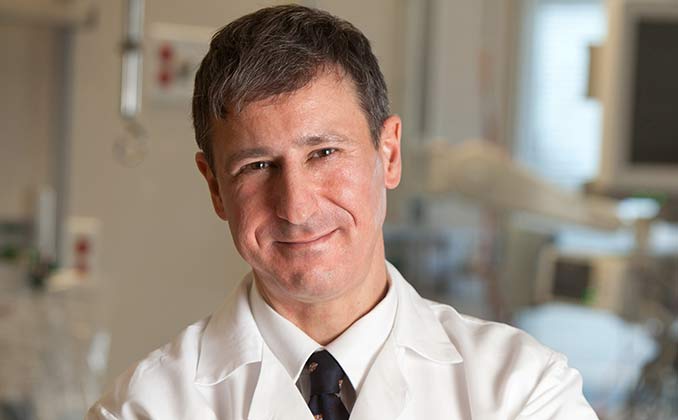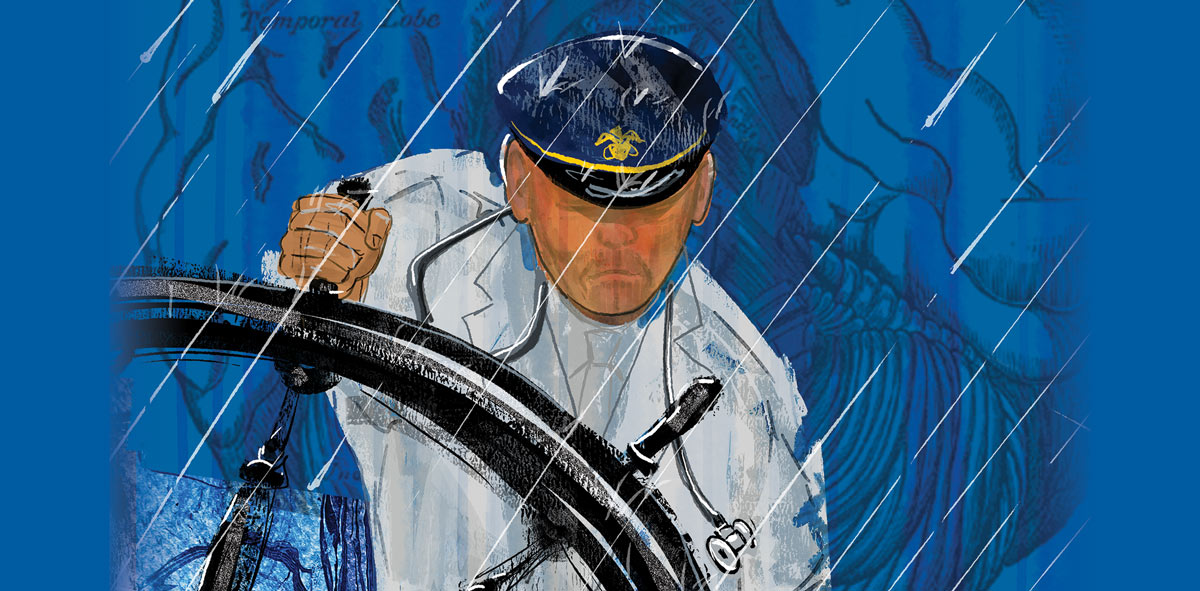Ignite | Spring 2022
Michael De Georgia: Teaming With Engineers in the ICU
“Leadership consists of nothing but taking responsibility for everything that goes wrong and giving your subordinates credit for everything that goes well.”
 President Dwight D. Eisenhower said later that he had made that observation as "sort of a wisecrack," but it speaks to a necessary component of leadership, says Michael De Georgia, M.D. ('89), director of the Neurocritical Center at University Hospitals Cleveland Medical Center, where he holds the Maxine Stone and John A. Flower Endowed Chair in Neurology. To behave as President Eisenhower suggested requires a level of confidence that can be a struggle for many people, particularly early in their careers, the neurologist said in a Zoom interview.
Similarly, admitting that you don’t know everything also requires confidence, says Dr. De Georgia, and it's helpful when forming collaborative partnerships. For example, he doesn’t try to prove his engineering expertise when he’s in the company of Case Western Reserve University engineers. And that situation comes up frequently. Here’s why.
President Dwight D. Eisenhower said later that he had made that observation as "sort of a wisecrack," but it speaks to a necessary component of leadership, says Michael De Georgia, M.D. ('89), director of the Neurocritical Center at University Hospitals Cleveland Medical Center, where he holds the Maxine Stone and John A. Flower Endowed Chair in Neurology. To behave as President Eisenhower suggested requires a level of confidence that can be a struggle for many people, particularly early in their careers, the neurologist said in a Zoom interview.
Similarly, admitting that you don’t know everything also requires confidence, says Dr. De Georgia, and it's helpful when forming collaborative partnerships. For example, he doesn’t try to prove his engineering expertise when he’s in the company of Case Western Reserve University engineers. And that situation comes up frequently. Here’s why.
When Dr. De Georgia manages a patient in the intensive care unit (ICU), he sees the same collection of tubes hanging above the bed and hears the same beeping monitors that everyone else does, but he notices something else: The monitor above the patient’s bed is collecting data, but it’s not connected to the ventilator next to the patient, or to the infusion pumps, or to the intracranial pressure monitor. What’s more frustrating, says Dr. De Georgia, is that physicians like him can’t analyze the data because it isn’t stored. It flits across the screen and then drifts off into space. Making sense of rapidly evolving complexity in the ICU requires data integration and a wide array of analytical tools. Working closely with Case engineers, Dr. De Georgia developed the Integrated Medical Environment (tIME), a system to help translate raw data into actionable information. As he puts it, “The end game is artificial intelligence and deep learning, which are buzzwords but really cool. And the massive effort is worth it. If the data from these monitors could be collected and combined, cleansed (to distill it to the most usable information), stored and made available for analysis, it could transform how physicians care for their patients. It's just that to get there, a lot of engineering is involved."
Dr. De Georgia always admired NEOMED professor and cardiologist Andre Ognibene, M.D., who used to wonder aloud when he took students on rounds, “Why is that happening?” The neurologist, neurointensivist and stroke doctor channeled that curiosity. Because he saw the benefits of better data integration and analysis, he initiated long-term projects such as the Integrated Medical Environment for Decision Support national consortium, which draws on the skills of engineers, scientists and clinicians alike. And he recently established the Center for Connected Health Innovation at Case Western Reserve University to further catalyze research and harness this technology to improve patient outcomes. His engineering colleagues are brilliant people who often bring a completely different perspective to the task at hand, says Dr. De Georgia. As a result, they approach problems differently, which can sometimes be frustrating but ultimately is valuable.
He has found that it is effective to lead with a humility born of confidence.
A solid medical education
Dr. De Georgia’s secure foundation began at NEOMED, where he says, “I was very fortunate to have an incredibly solid medical education and outstanding mentors,” such as neuroscience professor Ted Voneida, Ph.D., and internal medicine professor Dr. Ognibene. Dr. De Georgia initially completed an internal medicine residency at the University of Michigan with the plan of becoming a cardiologist. At the time, neurocritical care was just in its infancy, but the idea of saving the brain, not just the heart, appealed to his sense of meaning and wonder. The story of how he pursued it includes love and a leap of faith. Dating a German girl (who later became his wife) led him to pursue neurocritical care and stroke research at the University of Heidelberg in Germany, one of the premier, early hubs of the field, instead of staying in Michigan for a cardiology fellowship. Today, Dr. De Georgia encourages students and residents to follow their hearts, as he did.
“Trust your gut. Do what you are passionate about,” he says. “And choose your mentors carefully, as they often will play an important role in shaping who you are and who you become.”
In conversation, it’s quickly apparent that human emotions rank right up there with science for this thoughtful physician. For example, when meeting with the families of people with serious neurological injuries, he says, “I think that the residents need to understand that this is often the most traumatic experience this family has ever experienced in their lives. It’s an existential crisis. It's the most horrific thing they could ever imagine.
“I try to help the residents understand the humanity of the situation. Because they’re young, residents may not appreciate that this is somebody's wife or husband or father. These are actual people who, prior to today, were living normal lives. You don't think about those things until you're older and have aging parents and kids of your own.”

